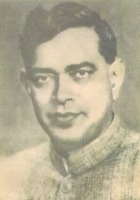Ramdhari Singh Dinkar
Ramdhari Singh Dinkar Biography
Ramdhari Singh 'Dinkar' (रामधारी सिंह 'दिनकर')was an Indian Hindi poet, essayist and academic, who is considered as one of the most important modern Hindi poets. He remerged as a poet of rebellion as a consequence of his nationalist poetry written in the days before Indian independence. His poetry exuded veer rasa, and he has been hailed as a Rashtrakavi ("National poet") on account of his inspiring patriotic compositions.As a mark of respect for him, his portrait was unveiled in the Central Hall of Parliament of India by the Prime Minister of India, Dr. Manmohan Singh on his centenary year, 2008. Dinkar initially supported the revolutionary movement during the Indian independence struggle, but later became a Gandhian.He was close to prominent nationalists of the time such as Rajendra Prasad, Anugrah Narayan Sinha and Braj Kishore Prasad. However, he used to call himself a 'Bad Gandhian' because he supported the feelings of indignation and revenge among the youth. In Kurukshetra, he accepted that war is destructive but argued that it is necessary for the protection of freedom. Dinkar was three times elected to Rajya Sabha, and he was the member of this house from April 3, 1952 CE to January 26, 1964 CE, and was awarded the Padma Bhushan in 1959. During The Emergency, Jayaprakash Narayan had attracted a gathering of one lakh people at the Ramlila Grounds and recited Rashtrakavi Dinkar's poetry: Singhasan Khaali Karo Ke Janata Aaati Hai. Biography He was born to a poor Bhumihar Brahmin family in Simariya village, in the Begusarai district of Bihar. As a student, his favorite subjects were history, politics and philosophy. He studied Hindi, Sanskrit, Maithili, Bengali, Urdu and English literature. Dinkar was greatly influenced by Iqbal, Rabindranath Tagore, Keats and Milton. He translated works of Rabindranath Tagore from Bengali to Hindi. Work His works are mostly of 'Veer Rasa', or the 'brave mode', although Urvashi is an exception to this. Some of his greatest works are Rashmirathi and Parashuram ki Prateeksha. He is hailed as the greatest Hindi poet of 'Veer Rasa' since Bhushan. Acharya Hazari Prasad Dwivedi wrote that he was very popular among people whose mother-tongue was not Hindi and he was a symbol of love for one's own mother-tongue. Harivansh Rai Bachchan wrote that for his proper respect he should get four Gyanpith Awards - for poetry, prose, languages and for his service to Hindi. Rambriksh Benipuri wrote that Dinkar is giving voice to the revolutionary movement in the country. Namvar Singh wrote that he was really the sun of his age. Hindi writer Rajendra Yadav, whose novel 'Sara Akash' also carried a few lines of Dinkar's poetry, has said of him He was always very inspiring to read. His poetry was about reawakening. He often delved into Hindu mythology and referred to heroes of epics such as Karna. He was a poet of anti-imperialism and nationalism, says well-known Hindi writer Kashinath Singh. He also wrote social and political satires aimed at socio-economic inequalities and exploitation of the underprivileged. A progressive and humanist poet, he chose to approach history and reality directly and his verse combined oratorical vigour with a declamatory diction. The theme of Urvashi revolves round love, passion, and relationship of man and woman on a spiritual plane, distinct from their earthly relationship. His Kurukshetra is a narrative poem based on the Santi Parva of the Mahabharata. It was written at a time when the memories of the Second World War were fresh in the mind of the poet. Krishna Ki Chaetavani is another poem composed on events that led to the Kurukshetra war in the Mahabharata. His Samdheni is a collection of poems reflecting the poet's social concern transcending the boundaries of the nation. In his Sanskiti ke Chaar Adhyay he said that despite various cultures, languages and topography, India stands united, because "however different we may be, our thoughts are one and the same". Awards and Honours He received awards from Kashi Nagri Pracharini Sabha, Uttar Pradesh Government and also an award by the Government of India for his epic-poem Kurukshetra. He got the Sahitya Akademi Award in 1959 for his work Sanskriti ke Char Adhyay. He was also a recipient of Padma Bhushan in 1959 by the Government of India. He was awarded the LLD degree by Bhagalpur University. He was felicitated as Vidyavachaspati by Gurukul Mahavidyalaya. He was felicitated as Sahitya-Chudamaniby Rajasthan Vidyapeeth, Udaipur on 8 November 1968. Dinkar was awarded the Jnanpith Award in 1972 for Urvashi. He also became a nominated member of the Rajya Sabha, in 1952. Dinkar's fans widely believe that he truly deserved the honour of "RashtraKavi" (poet of the nation). Posthumous Recognitions On September 30, 1987, to mark his 79th birth anniversary tributes were paid to him by the then President of India, Shankar Dayal Sharma. In 1999, Dinkar was one of the Hindi writers featured on a set of commemorative postal stamps released by Government of India to celebrate the "Linguistic Harmony of India." marking the 50th anniversary since the Indian Union adopted Hindi as its official language. The government released a book on Dinkar's birth centenary authored by Khagendra Thakur. At the same time a statue of him was unveiled in Patna at the Dinkar Chowk, and a two-day national seminar was organised in Calicut University. The Bihar government has declared that a Hindi University to come up at Begusarai named after him. The New University will be named as Rashtra Kavi Ramdhari Singh Dinkar Hindi University.)

Please share this above cited lyrics on my email anetrabylegmail. I'd be highly obliged and appreciative if you can share the lyrics. I searned on google but to no respite